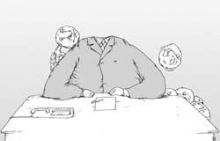In his speech commemorating Ukraine’s Independence Day, the president focused on at least two crucial points. He promised to continue the government’s personnel renewal, during which those who “think they have weathered the first phase and can continue to exercise their authority in the old way” should recognize the error in their thinking. Several days later, Deputy State Secretary of Ukraine Markiyan Lubkivsky specified that the coming “personnel reshuffle tsunami” will take place in September. Below Vadym KARASIOV, the noted Ukrainian political analyst and director of the Institute of Global Strategies, ponders how and to what degree the face of the Ukrainian government may change during the next wave of cadre changes.
V.K.: Top-level personnel changes in September are a possibility. However, they will probably not be accompanied by any pomp, political maneuvers, or demonstrative appeals to the president or electorate. Rather, they will take place in the form of lateral personnel movements. In other words, they will most likely be horizontal rather than vertical rotations, with some nominees for personnel changes being removed from the cadre pool. This type of format is connected to the need to resolve electoral tasks. This will be done according to the new president’s style, which still consists of uniting and ruling, rather than dividing and ruling. Despite the trend to set up administrative-clan groupings and trigger administrative-clan conflicts, the Ukrainian president is trying to act as “cadre plasma,” which is aimed at extinguishing conflicts, thus preventing them from causing a rift in his team. Hence, the unite-and-rule principle will dictate the form of the personnel changes.
In view of the coming parliamentary elections, it is important for the government to avoid creating new hotbeds of resistance or a new opposition on the basis of retiring personnel. Thus, it would be better to carry out a horizontal reshuffling by taking this factor into account.
Be that as it may, the coming cadre changes may well affect the Presidential Secretariat and the Cabinet of Ministers of Ukraine. Since intensive and large-scale reshuffles are now taking place within the diplomatic corps, vacancies that are opening up in leading diplomatic posts are allowing room to maneuver via lateral personnel movements. It is possible that some deputy prime ministers will be shifted to more important diplomatic posts to the north and east of Kyiv. The vacant key vice premier’s seat may be occupied by a rank-and-file deputy in order to boost the president’s presence in the cabinet. Another possibility is that at the start of the parliamentary campaign the prime minister will be advised gently (or perhaps not so gently) to take a pre-election vacation, which will serve to quietly detach Ms. Tymoshenko from her prime ministerial resource, so important to the elections. This may happen both in the event that the prime minister takes part independently in the election campaign or within the general mega bloc, in which case the newly appointed first deputy prime minister will actually be the one who politically controls the Cabinet of Ministers and coordinates the entire government’s election campaign. This is just one option.
Bearing in mind the permanent state of conflict between the Cabinet of Ministers and the National Security and Defense Council, there is another option: the personnel, infrastructural, and administrative reinforcement of the Secretariat, which would mix up this conflict and concentrate the president’s resource in one center of authority and influence. This too is crucially important on the eve of the decisive election campaign.
It is also possible that someone from the government’s economic bloc will somehow (but gently) be forced to tender his resignation. This may be determined by various reasons, including circumstances related to his or her involvement in the election campaign or orientation toward political posts that will be up for grabs. This will require resigning from the cabinet, so as to be able to take part in the elections on a full- fledged basis. In any event, even if the harsher version of retirements in the economic bloc is chosen over the milder one, there will be no fundamental shakeups in the cabinet or the foundation of the governmental structure.







